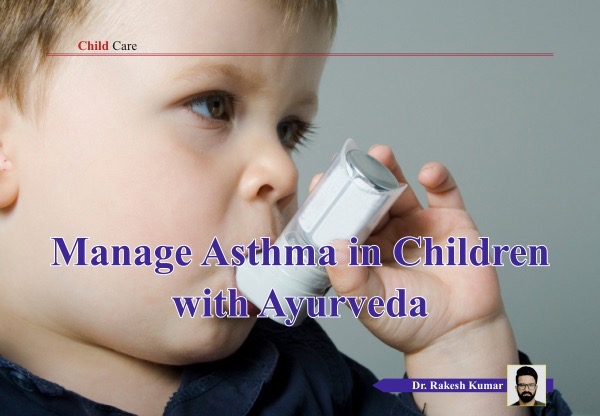Bronchial asthma is a medical condition which causes the airways of the lungs to swell and narrow. Because of which excess mucus is produced making it hard to breathe, resulting in cough, short breath, and whistling sounds. It is a chronic disease in children, leading to school absenteeism, hospitalization, economic and psychological stress in the family.
Bronchial asthma is a medical condition which causes the airways of the lungs to swell and narrow. Because of which excess mucus is produced making it hard to breathe, resulting in cough, short breath, and whistling sounds. It is a chronic disease in children, leading to school absenteeism, hospitalization, economic and psychological stress in the family. Worldwide, the prevalence of asthma is on the rise. It is estimated that 14% of children in the world experience asthma symptoms and is seen more in urban than in rural areas. When segregated by gender and age, asthma is noticed more in boys in the age group of 12–14 years and more in girls in the age group of 14–16 years. Exact reason is not known but following may lead to this condition in children
• Exposure to more and more environmental allergens such as dust, air pollutants and second-hand smoke.
• Lower rates of breastfeeding which has prevented important substances of the immune system from being passed on to babies.
Risk factors
• Allergies
• Family history
• Low birth weight
• Respiratory infections
• Low-income environment
• Exposure to tobacco smoke
Clinical features
• Chest tightness
• Rapid breathing
• Shortness of breath
• Feelings of tiredness
• Less energy during play
• Retractions in the chest
• Whistling sound when the child is breathing in or out.
• Frequent coughing spells while the child is playing, laughing or at night or right after waking.
Asthma is often difficult to diagnose in infants. However, detection can be done in older children on the basis of medical history, symptoms, physical examination and by certain tests like X-rays and pulmonary functions tests.
Ayurvedic Management
In ayurvedic texts there are many herbs and their formulations are mentioned which work as wonders to control the features and raise the immunity.
HERBS
Kantakari
Good for asthma patients due to its cough-relieving and anti-inflammatory properties. Decreases inflammation and the excess production of mucus in the air passages. Has anti-allergic properties due to which it inhibits allergic response.
Vasa
Works as an expectorant, which loosens the sticky phlegm and makes it easier to expel it from the chest and air passages. Relieves asthma attacks by reducing bronchial tree irritation and spasm.
Shunthi
Acts as bronchodilator and exhibits anti-oxidative and anti-Inflammatory properties.
Bharangi
Acts as an expectorant and has anti-inflammatory properties. It also acts as bronchodilator and mucolytic and is used to breakdown the thick mucus and ease it out from body.
Pushkaramoola
Works as a bronchodilator and expectorant.
Karkataka shringi
Acts as expectorant by clearing out the mucus from airways. This herb also strengthens the inner lining of the respiratory tract.
Haridra
Used as an antioxidant and possesses various beneficial properties such as anti-inflammatory, anti-allergic and antiseptic.
Pranayama and Yogasanas
Practice of pranayama and different yogasanas helps in the management of asthma in children. Some of them are mentioned here:
Anuloma viloma, Kapaal Bhaati, Bhramari pranayama, Ardha Matsyendrasana, Pavanamuktasana, Setu Bandhasana, Bhujangasana and Shavasana.
Ayurvedic formulations
Balchaturbhadra churana, Talisadi churna, Sitopaladi churna, Somlata churna, Shringyadi churna, Vasa avaleha, Kantakari avleha, Kanakasava, Lavangadi vati, and Mahalakshmivilas ras.
Diet
Dietary modifications can ward off asthma. Studies show that diet infused with antioxidants and polyphenols lowers the chances of asthma. Common food that can be added to the dishes on dinner table are lentils, cinnamon, haldi, ginger, basil and berries.
Assistant Professor
Department of Kaumarbhritya
Dayanand Ayurvedic College, Jalandhar-8 (Pb)
Mob.: 82199 18360







 Dec 2024
Dec 2024
 May 2024
May 2024
 September 2022
September 2022
 April 2022
April 2022
 October 2020
October 2020
 Jan 2020
Jan 2020
 June 2019
June 2019
 January-February 2019
January-February 2019
 Augest-September
Augest-September
 April 2018
April 2018
 November 2017
November 2017
 June 2017
June 2017
 November 2016
November 2016
 September 2015
September 2015
 March 2015
March 2015
 July 2014
July 2014
 January 2014
January 2014
 July2013
July2013
 March 2013
March 2013
 May 2012
May 2012
 May 2011
May 2011
 Sep 2010
Sep 2010
 Jun 2010
Jun 2010
 Feb 2010
Feb 2010
 December 2009
December 2009
 August 2009
August 2009
 June 2009
June 2009
 Feb 2009
Feb 2009
 December 2008
December 2008
 October 2008
October 2008
 March 2008
March 2008
 July 2008
July 2008
 May 2008
May 2008